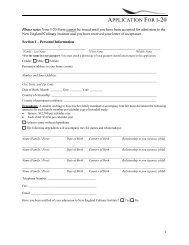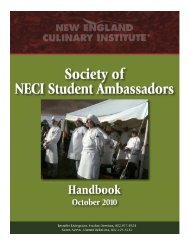Academic Catalog - New England Culinary Institute
Academic Catalog - New England Culinary Institute
Academic Catalog - New England Culinary Institute
Create successful ePaper yourself
Turn your PDF publications into a flip-book with our unique Google optimized e-Paper software.
Fundamentals in Management<br />
CMBM2902 – 3.0 credits<br />
This course provides students with a brief introduction<br />
to business management. Students are introduced to<br />
income statements, examine the cost of goods and<br />
labor, and learn about the importance of each as a tool<br />
for monitoring and adjusting business practices.<br />
Through classroom activities and project-based<br />
computer labs and assignments, students begin to<br />
explore basic Excel applications. Using examples and<br />
projects typical for the industry, students are<br />
introduced to financial performance as it impacts a<br />
business enterprise.<br />
Fundamentals of Marketing<br />
HEBM1702 – 1.0 credit<br />
This course is an introduction to marketing concepts<br />
and their application to a variety of fields. Students<br />
conduct market research and develop a marketing<br />
strategy for a simple business concept. Primary areas<br />
of application are in internal marketing strategies—<br />
including merchandising and menu development,<br />
customer service, and guerrilla marketing tactics.<br />
These concepts will enable students to analyze<br />
marketing practices and make recommendations about<br />
how to more efficiently use resources and increase<br />
profits.<br />
Global Cultures & Cuisine<br />
DOAS3500 – 5 credits<br />
This course introduces and guides the student toward<br />
an understanding of the some of the major food<br />
cultures and regions of the world. Students will explore<br />
the foundations of these cultures through a study of<br />
history, societal norms, and major religious and<br />
political movements, as well as influencing factors<br />
such as climate and geography. As world cuisines<br />
continue to be an influential component of American<br />
cuisine, ethnic restaurants account for a large<br />
percentage of American food sales annually. In this<br />
course, students will use traditional techniques to<br />
produce meals representative of Asia and the Middle<br />
East. Students will explore specific ingredients and<br />
essential characteristics of the selected cuisines to gain<br />
a better understanding of the food ways and flavor<br />
profiles indicative of Asian/Middle Eastern cultures.<br />
Health & Wellness<br />
BCHW1003 – 15.0 clock hours<br />
The goal of this class is to give students the knowledge<br />
and practice that will help maintain their health and<br />
well being in a sometimes-stressful industry. Students<br />
will spend class time discussing several facets of good<br />
health and the many possible ways to achieve and<br />
maintain it. Based on this knowledge, students will<br />
develop their own personal exercise and nutrition<br />
goals. The remainder of class time will be spent putting<br />
these plans into action. The Independent Study portion<br />
of this course will allow students to further develop<br />
their personal health and wellness goals by practicing<br />
and documenting an aerobic exercise regime.<br />
History and Culture<br />
CMCT1951 – 1.0 credit<br />
This course introduces students to the important interrelationships<br />
between society, history, and culture. It<br />
emphasizes the periods from early hunter-gatherers and<br />
the rise of agricultural societies to the impact of the<br />
Columbian Exchange on world trade, the development<br />
of European and Mediterranean lifestyles, and the<br />
cultural habits of Americans. Through lectures,<br />
discussions, research assignments we explore the<br />
characteristics of selected cultures. Students are<br />
introduced to the important connections between<br />
agriculture, religion and culture over time.<br />
History and Culture Seminar<br />
DECT3900 — 1.0 credits<br />
In this course students develop an understanding of<br />
some of the major regions and cultures in today’s<br />
world. Students explore the foundations of various<br />
cultures through a study of their history, societal<br />
norms, and major religious and political movements, as<br />
well as influencing factors such as climate and<br />
geography.<br />
Human Resource Management<br />
HMBM3500 – 3.0 credits<br />
Human Resources in the Food Service Industry<br />
HOBM3500 — 5.0 credits<br />
This course focuses on preparing students—both<br />
personally and professionally—for entering the<br />
industry as a manager. With an emphasis on personal,<br />
managerial, and human resources management skills<br />
students are prepared for applying these skills later in<br />
the program, and as they move into a business career.<br />
The course introduces students to both theories and<br />
skills, and provides opportunities to practice<br />
communication, presentations, and leadership. The<br />
course also covers the key employment and labor laws<br />
that will affect how students will manage and make<br />
decisions about issues involving discrimination,<br />
harassment, and disability policies and legislation.<br />
Page 32






